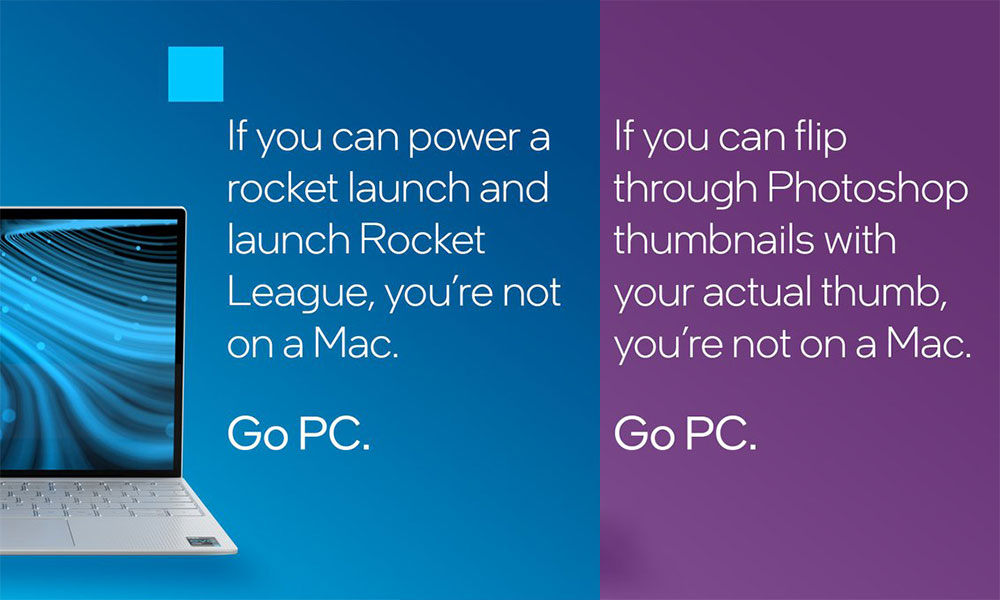Intel Is Hitting Back Hard at Apple’s Transition to M1 Chips with Aggressive New Ad Campaign
 Credit: Intel
Credit: Intel
Toggle Dark Mode
After a 15-year partnership in which Apple and Intel seemed like the coziest of friends, with Apple even having funded many of Intel’s innovations, it seems that the chipmaker is now responding to their breakup like a jilted lover, with an aggressive new ad campaign that’s clearly fighting against Apple’s insanely powerful new M1 chips.
For years, what little marketing Intel did was understandably platform-neutral. After all, Intel chips were found in PCs and Macs alike, and the company wasn’t about to bite either of the hands that fed them. However, now that it’s clear that it’s being shown the door on the Mac side, Intel has decided to launch a pretty hard-line series of ads touting the supposed benefits of those platforms that use their chips, while mocking Apple’s new M1 chips.
In fact, it’s a rather pointed ad campaign that doesn’t just highlight the benefits of PCs, but outright puts down Macs based on things that the M1 chip supposedly can’t do.
For example, one ad reads, “If you can power a rocket launch and launch Rocket League, you’re not on a Mac,” while another includes the slogan, “If you can flip through Photoshop thumbnails with your actual thumb, you’re not on a Mac.” All the ads close with the tagline, “Go PC.”
In addition, Intel has also sponsored a video by YouTuber Jon Rettinger of TechnoBuffalo, who tries to illustrate the frustrations of using an M1 MacBook Pro by first searching for “Cyberpunk 2077 Mac” on Google with a head-shaking sigh, followed by trying to plug a USB-A connector into the MacBook’s USB-C ports before closing the lid and throwing his hands up in frustration.
Now, to be fair, Rettinger admits right after this that the M1 Mac has been “amazing and awesome” in many ways, but that after Intel asked him to talk about their new Evo platform, he also wanted to clear up the notion that Intel is “out of the race.”
So I’m pretty vocal about using an M1 Mac pretty much since launch, and for a lot of uses it’s been amazing and awesome. But the more I use it as my only computer, I realize there’s still a lot of stuff that it either doesn’t do right now, or just doesn’t do at all. So Intel reached out to see if we wanted to talk about their new Evo platform.
Jon Rettinger
Rettinger adds that “this couldn’t be further from the truth,” and goes on to point out all the stuff that you still get on an Intel laptop that you’re just not going to get from a Mac. He then goes on to highlight all the benefits of Intel’s Evo platform, and the advantages of features like standard USB ports, touchscreens, eGPU support, and the ability to use multiple displays.
However, while Rettinger insists that Intel didn’t tell him what to say in the video, and Rettinger does seem sincere in his statements, the whole thing still feels like little more than an Intel infomercial.
Some of these are things that MacBooks have never had anyway, but of course Intel wasn’t talking about them when those Macs were using Intel chips. For instance, Apple made the wholesale switch to USB-C years ago, so it’s a bit disingenuous to suggest that this is a failing of the M1 chip.
It’s a bit ironic that this ad campaign is making the rounds now, since technically speaking, most of the Macs that Apple sells are still packing in Intel chips; the M1 is exclusive to Apple’s lower-end hardware, and shares some of the same limitations that the earlier Intel models did, such as lack of support for multiple external displays and limited USB-C ports.
At this point, however, there seems to be little doubt that Intel is feeling threatened by Apple’s M1 transition and all the attention it’s getting, and it already became apparent that it was gearing up for battle when a new CEO took over last month, denigrating Apple as a “lifestyle company in Cupertino,” when speaking to employees.
Along the same lines, Intel provided a series of benchmarks last week showing how its new 11th-gen “Tiger Lake” processors can actually compete against Apple’s M1, however while all vendor-provided benchmarks should be taken with a grain of salt, most reviewers observed that the company was tilting the scales in its own favour even more than normal, using inconsistent test platforms and likely omitting data that wasn’t favourable to it, in a move that Jason Snell referred to as “M1-unfriendly,” and featuring a “not-so-faint whiff of desperation.”
What does seem certain is that we’re going to see another resurgence of the old Mac-vs-PC wars as Apple continues to move even deeper into its own Apple Silicon, ultimately cutting Intel entirely out of the pie.






